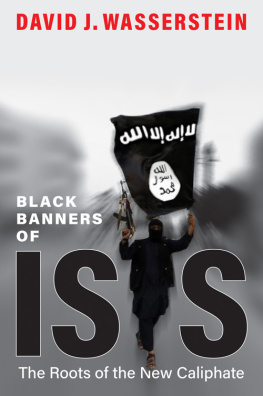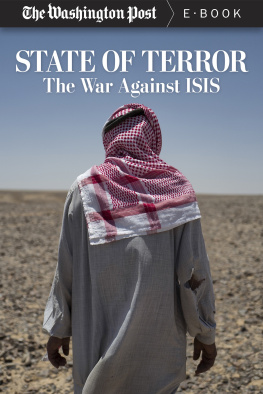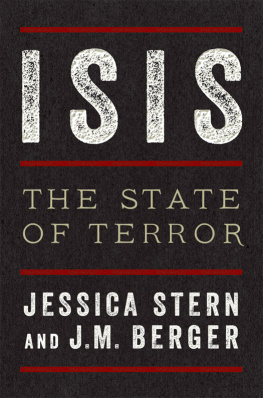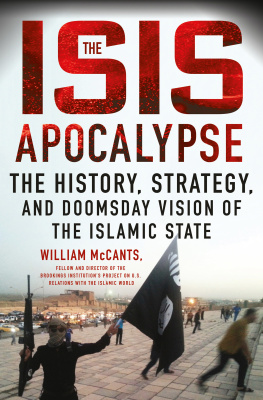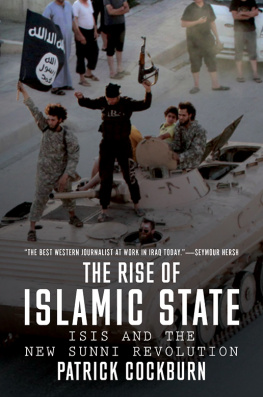MY JOURNEY
INTO THE HEART
OF TERROR
Ten Days in
the Islamic State
Jrgen Todenhfer
Translated by A.O. May
For Frederic, who made a huge contribution to the journey and to the development of this book. Without him this book would not exist.
TABLE OF CONTENTS
Introduction
IN THE MANY court cases I have been involved in, first as a junior lawyer and later in my short time as a judge, I often found myself on an emotional roller coaster. After the prosecutors arguments, I usually thought the accused was a scheming scoundrel. But as soon as the defense made its case, everything looked completely different. I was all for leniency. Assessing who was right and to what extent were the most difficult decisions of my life. One side is hardly ever completely without fault, and there are almost always arguments in favor of the other side. Rarely did I feel that the final decision was absolutely correct.
The lesson I took from this was that if you want to find the truth, you must speak to both sides. Even when the world has already pronounced its judgment. An important principle of Roman law is audiatur et altera pars (listen to the other side). So in the eighties, I spent time with different groups of mujahideen in what was then Soviet-occupied Afghanistan. Then I spoke twice with Marshal Sergei Achromejew, the head of the Soviet military in Moscow, even though the Soviet government had publicly declared that if they caught me, they would have me flogged and then shot. For hours we discussed whether it would not be smarter for the Soviet Union to withdraw from Afghanistan. Achromejew was a very open man and he knew how to listen.
It was Easter 1975 when I met with the Chilean dictator Augusto Pinochet in Punta Arenas to negotiate the release of 4,500 political prisoners, most of whom were Marxists. But I was also there to understand the situation in Chile after the fall of Salvador Allende. After meeting with Pinochet, I flew to the capital, Santiago, to speak with the leaders of the opposition, the Christian Democrats Eduardo Frei Montalva and Patricio Aylwin. Back in Germany, I was subjected to a torrent of abuse for my attempt to build an objective picture of the situation. I was labeled a supporter of dictatorships. Even though many thousands of prisoners were later set free, this did not change the fact that for many years I was drowned out at large events by the chants of furious crowds waving banners depicting Pinochet.
Despite this, in my search for the truth I stuck with my strategy of speaking with both sides whenever possible. Mostly this strategy garnered indignant protests from those who pass judgment on the world from the comfort of their armchairs and are convinced that they alone are in possession of the truth. I spoke on numerous occasions with Hamid Karzai, the president of Afghanistan, but I also spoke with leaders of the Afghan Taliban. For countless deskbound strategists, such as the former chief of staff of the German armed forces Harald Kujat, I was from then on the mouthpiece of the Taliban. For others I was quite simply a terrorist sympathizer.
I temporarily lost the label terrorist sympathizer when I met Bashar al-Assad many times in Damascus in 2012. I met with him not only to conduct an interview for the ARD (German public broadcasting consortium) program Weltspiegel but first and foremost to establish direct contact between Assad and the U.S. administration. I was firmly convinced that the USA could reach a peaceful settlement in Syria with the help of their allies Saudi Arabia and Qatar, who were supplying the insurgents with weapons. Assad was open to far-reaching concessions, and I passed this information along to the American government. But the U.S. government absolutely refused to speak with him.
Another wave of outrage washed over me. Ethical Germany turned up its nose. Politicians and journalists foamed at the mouth as they asked how I could speak to a man who had so much blood on his hands. And all the while they would have given their eyeteeth for a meeting with George W. Bush, who had infinitely more blood on his hands. Die Welt wrote: The interview is faintly reminiscent of earlier conversations of other idealistic journalists and misguided thinkers who met the nice, heroic Joe Stalin during the war or who extolled the virtues of the amazingly knowledgeable leader from Berghof before the war, who was after all only striving for the things all of us strive for, such as the right to self-determination for all people, including the Germans.
Stalin and Hitler! You cant get any lower than that. No one was interested in the fact that no Western journalist before me had ever had such a hard-hitting conversation with the Syrian president. There was also little interest in the fact that at the same time as I was speaking with Assad, I was having countless conversations with his opponents, the fighters of al-Qaeda, the Free Syrian Army ( FSA ), and other rebel groups. Even former West German chancellor Willy Brandt developed his Ostpolitik, or new Eastern policy, only after sitting down with the ruthless Leonid Brezhnev. But for my critics, this proven past success was no justification for my actions.
THE WEST DIVIDES the world into good and bad, and as former U.S. president Jimmy Carter has said, since the time of George W. Bush, it has harbored a deep-seated aversion to having conversations with its enemies. Carter made that statement in 2005, after George W. Bush forbade him from making a previously arranged visit to Damascus. The axis of good doesnt speak with the axis of evil. If you go ahead and do it anyway, you have to deal with social sanctions.
This is what Ines Pohl, then editor in chief of the German daily newspaper taz, wrote to me in June 2014, comfortably convinced that she was occupying the moral high ground: Dear Mr. Todenhfer, taz will not publish the piece you offered us. A large majority of the editors have spoken against publishing reports from you in taz. It is not about your innately radical pacifist arguments but about you as a writer, in other words, about the position you have taken for the past three years on Assad and the subject of genocide. I respect my editors judgment. With best wishes, Ines Pohl, editor in chief, taz.
Should I even reply to such a sanctimonious letter? I did reply, because I will not give up hope that one day the morally superior mainstream in Germany who oppose negotiations will indeed change their thinking. I hope that they will recognize that even when dealing with dictators, it is always better to negotiate than go to war. That our enemies are precisely the ones we must talk to. That they will understand that if we dont do this, our world will be destroyed in the chaos of endless conflict. So I wrote:
Dear Ms. Pohl,
I am amazed. I write as someone who has traveled halfway around the world many times to speak with many governments as well as many opposition movements in order to help find a peaceful solution to the crisis in Syria. Who has spent a gazillion euros to pay for prosthetics for fifty tiny victims of the war in Syria. Who every month looks after the living expenses of a family in Homs who has lost its wage earners because of Assads security forces. Who because of this has been labeled an enemy of the state by the Syrian governments intelligence service and who therefore can no longer get a visa to visit the country. Such a level of self-righteousness on the part of a large majority of your editorial team leaves me flabbergasted. It must feel good to write such a disparaging letter from your air-conditioned office. Congratulations! I am always pleased to meet real heroes. Now I know where to find them.


